A Hand to Strangers in a Strange Land
by Hugo Bravo
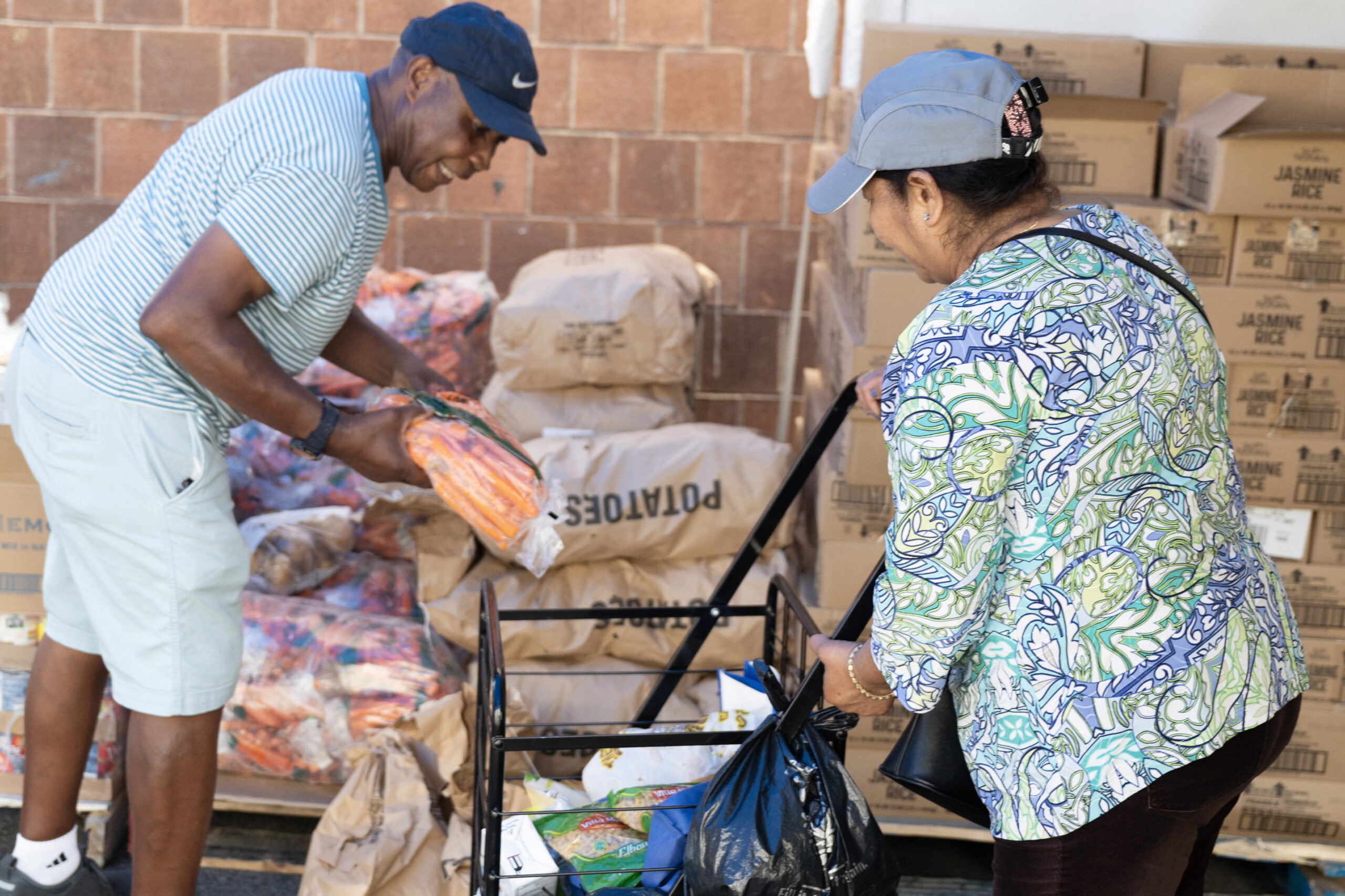
The Salvation Army is helping meet the needs of immigrants and their families.
Sometimes when I sit down to write about immigrants and their connection to The Salvation Army, my mind goes back to April 10, 1988. That was the day my mother and I boarded a plane from Lima, Peru, to Newark International Airport. I was 5 years old. My father, who’d arrived in the United States two years prior, had a rented rear-lot house ready for us in Paterson, N.J., a city that, its residents like to say, has more Peruvians than any other place in the world, minus Peru itself.
Four decades and three citizenships later, I can look back at our arrival and be grateful that despite facing hardships, we were among the most fortunate of immigrants. Language barriers eventually broke down with study and practice (for me personally, a healthy diet of American rock music helped). My parents had both majored in psychology at the University of Lima, so my father found steady work as a family therapist during the day and as a janitor in the evening. My mother did shifts at factories and print shops. Child care was not an issue. I was already of school age, and by the time my sister was born, we had friends and neighbors who were happy to watch us while our parents worked days, nights, and weekends. Perhaps most important of all, our future as residents of the United States of America was never in doubt. We weren’t afraid that government agents might appear at our door to separate us or send us back because of a change in presidential administrations or misfiled paperwork. We were stable and safe here.
The same cannot be said for thousands of families entering this country now from all over the world. None of us can simply ignore the people who have come to our own communities in search of a better life. The Bible stresses the importance of extending “hospitality to strangers” (Romans 12:13) and showing love to the “alien who resides” with us (Leviticus 19:34).
When The Salvation Army arrived on these shores during the late 19th century, it too was a target of society’s anti-foreigner sentiment often aimed at Chinese, Irish, and Italian immigrants. Though small in number in those years, Salvationists, with their distinctive culture and willingness to upend traditions, faced much hostility. But it didn’t deter them from thriving or, throughout the years, helping strangers new to America.
The Salvation Army’s mission, resources, and diversity among its pastors make it uniquely equipped to give immigrants a hand. Its officers and members have shown the heart and dedication to welcome people from many cultures to their churches and communities. In turn, their congregations and ministries have only grown richer by following Proverbs 3:27: “Do not withhold good from those to whom it is due, when it is in your power to act.”
The Kearny kids are alright
Envoy Emily Betts’ first assignment as a Salvation Army pastor was in Kearny, N.J., a city that is 45% Hispanic or Latino, with immigrants hailing from countries like Ecuador, Peru, and the Dominican Republic.
“When I arrived in 2021, the Kearny Corps’ Sunday congregation was not reflective of the city’s demographics, or even of the Spanish-speaking families that visited our food pantry during the week,” says Betts. “An employee who spoke Spanish was our connection to the community. When she left, I had to step up. Even though I didn’t speak Spanish, I saw it as an opportunity to dramatically change the direction of our corps.”
She decided to start by promoting the children’s programs at the church. Anyone who came in for social services was informed about the ministries available for their kids. Within two weeks, those programs went from 10 children to an average of 30. As the number of kids grew, so did the numbers across other programs.
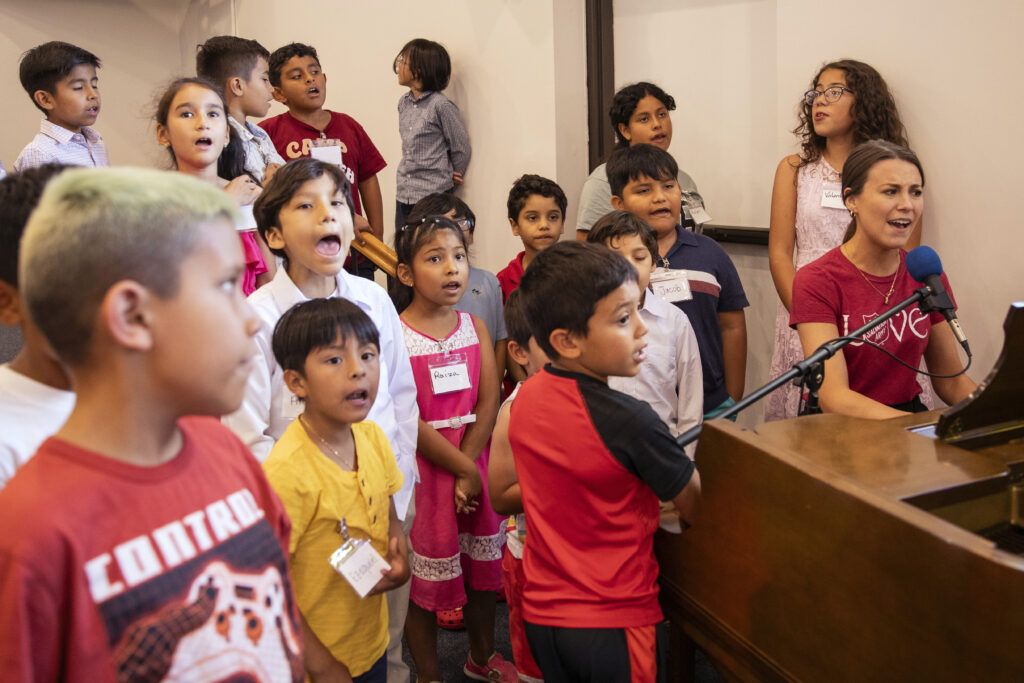
Envoy Emily Betts (top, at piano) says the young people of the Kearny Corps have given the church new life through music and sports.
“More and more adults were aware of what our corps had to offer for them and their families,” says Betts. “Any time our corps kids held a music recital, for example, 100 people would show up to watch, all Spanish-speaking families. We decided to keep our kids’ programs running all summer long, and with expanded hours.”
The church’s most popular programs aren’t the ones driven by social services, but instead, it’s the relational, character-building ministries, like board game nights, English as a second language classes, and Bible study.
“Before this, we weren’t doing Bible study, because as much as we wanted to do both languages, we didn’t have someone who could lead it in Spanish,” says Betts. When they found a Spanish-speaking ministry assistant, they were able to launch Bible study in English and Spanish.
The church also started to hold bilingual Sunday services once a month with the help of a translator from The Salvation Army’s New Jersey Divisional Headquarters. After two months, they expanded to every Sunday and added worship songs in Spanish too. For Betts and the English speakers among the congregation, singing a song in Spanish was easier than trying to speak the language, since it only required a focus on pronunciation.
“When we truly welcomed Spanish on Sunday, the parents of the children in our programs started coming more,” says Betts. “I was told that the Kearny Corps was once a very ‘traditional’ corps, but we needed to follow up on the tradition of making everyone feel welcome.
“Someday there might be an officer here that speaks perfect Spanish and is directly in charge of the outreach, but as it is now, I’m happy to be in a place where everyone, old and new, embraces the cultures in our congregation. It’s a beautiful new normal and an example of how God can work and transform His church for everyone.”
A fortunate son (and daughter-in-law)
In their home country of Albania in southern Europe, Ermal Hysko and his wife, Rezarta Prence, heard the stories that many people hear. America is the perfect place to live, and if you are fortunate enough to come here, anything is possible.
“Of course, it wasn’t quite like that,” says Ermal. His parents had immigrated to Quincy, Mass., three years before their own arrival in 2016. “My parents warned me that living in America would not be easy. But there was opportunity here, and I knew if I worked hard, I would not go unnoticed. That’s much different than in Albania, where due to nepotism, it’s almost impossible to find any type of work, no matter how small.”
The Salvation Army’s mission, resources, and diversity among its pastors make it uniquely equipped to give immigrants a hand.
Rezarta recalls that when she and Ermal got to Quincy, Ermal’s father told them about the first time he walked into The Salvation Army there. She says, “He beamed about meeting a social worker who gave him gift cards to buy food and furniture for their empty apartment.”
Ermal’s mother suggested that since Rezarta had done social work in Albania, she should look into similar work here.
“But Ermal and I had come to America while I was pregnant with our first child. I wondered, who would ever want to hire me?” says Rezarta.
To her surprise, she got a job as director of the Quincy Corps preschool. She is now the social services manager at The Salvation Army in Quincy, helping families just like the Army once helped her in-laws.
“God always knows what’s ahead for all of us, which is why the pastoral care that comes with the Army’s assistance is so important,” says Rezarta. “Many people who come to us ask us to pray with them in a private setting. Our officers sit with them and assure them that their prayers are being heard.”
Ermal, who is the regional social ministries manager for The Salvation Army in Greater Boston, says, “Stable, affordable housing is the main need for these immigrant families. We can guide them toward agencies like the Housing Authority that can help them achieve that goal. But there’s still more to do. They need health insurance, so they don’t have to deal with a $5,000 hospital bill if someone gets sick.”
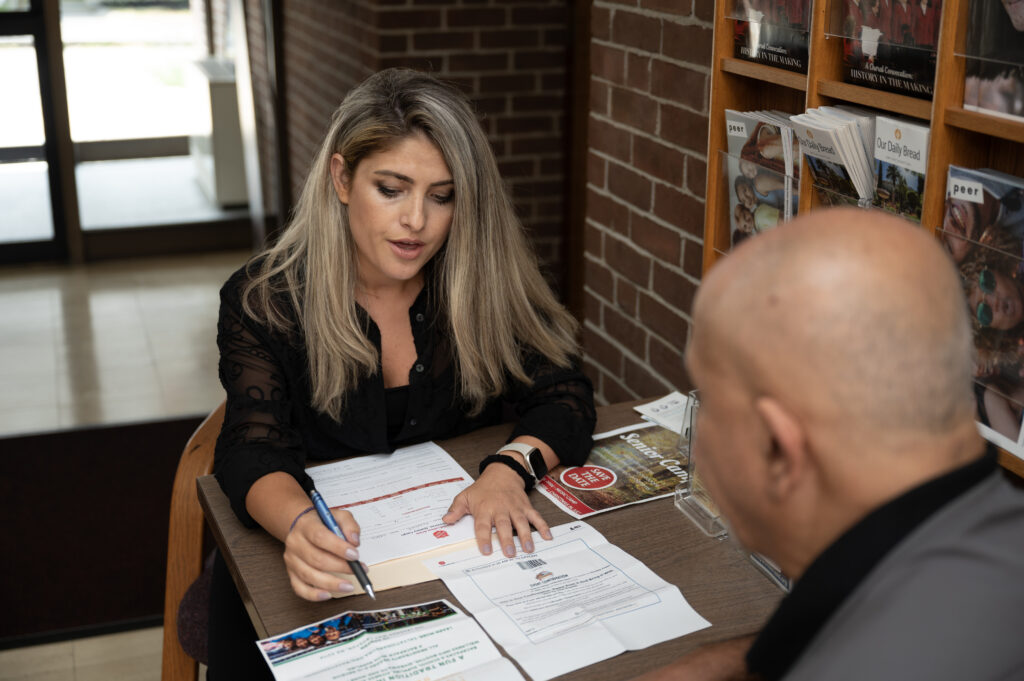
Through a variety of programs at The Salvation Army in Quincy, Mass., Rezarta Prence helps families and individuals find homes, resources, and employment.
They also need help with finding employment. “Dunkin’ Donuts in Massachusetts will accept employees with just an ITIN,” an Individual Taxpayer Identification Number, says Rezarta. “But if you’ve just arrived here from another country, how would you even know that? It’s not just about giving someone food and clothes. It’s helping them get to a better situation in one or two months than they are today.”
One of her cases involved a couple in their late 70s from the Dominican Republic. They had no other family and were living in their car, trying to survive the cold Massachusetts winter with health issues. Rezarta was able to give them a hotel voucher to get them out of the street, then connected them to the Quincy Housing Authority, which managed to find them an apartment.
“You see a lot of grateful, emotional breakdowns when a family like them walks inside a shelter or a home for the first time,” says Rezarta. “The husband said I was their Mother Teresa, who was also Albanian. Hearing that made me cry.”
“I always think about our own immigrant story,” says Ermal. “We came here with green cards and guidance from my parents. We lived with them for a year rent-free. And even with all that help, we still had our own struggles.
“Imagine a family that has no one. They don’t know the language, the culture, or the legislation that will directly affect them. If there is ever a time that they need all the assistance and guidance they can get, this is it. Helping those families is more than just a job for us.”
Chelsea’s hungry hearts
The comparison is all too apt. Every week a line of people, stretching around the block of the corps, wait for food. It’s reminiscent of the kind of scene at the entrance to a sold-out concert.
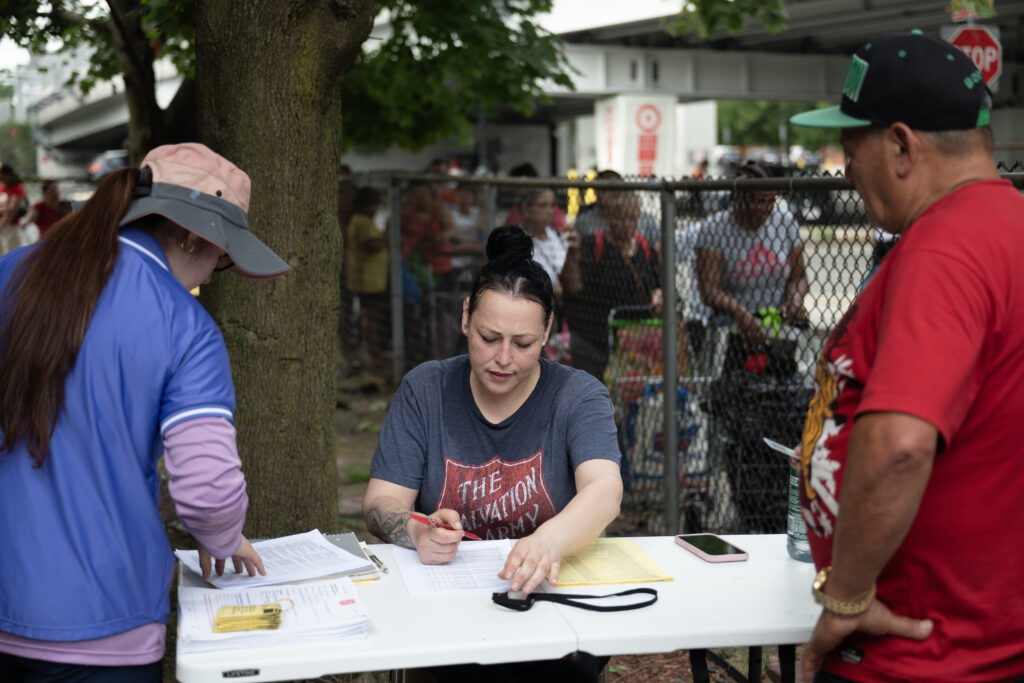
The Chelsea Corps registers people who get help from its food pantry.
“Chelsea serves about 1,200 to 1,500 families weekly,” says Ermal. “That’s 10 times higher than other Salvation Army pantries in Massachusetts. We’ve even had families from Connecticut and Rhode Island drive hours here to get food. It’s why they’ve had to implement registrations and refer out-of-state families to their own local Salvation Army.”
It can be hard to stop and talk to someone with over a hundred people waiting for food behind them. So proper registration also allows Salvation Army caseworkers to follow up with the families who come to the food pantry, seeing what the church can do for them besides food services.
“Chelsea is not a very large or heavily staffed corps, but they have a lot of volunteers who help with their food pantry, and praise God for each of them,” says Ermal. “We get feedback from Chelsea families that say we are the only source of food for them every week. They come back because they know that with us, they are not going to be judged. We help and respond to them with respect and dignity. When you include those qualities in the work you do for others, people take notice.”
Bridge over troubled water in Dover
Captains Reginald and Ardrine Montour, Haitian immigrants and corps officers at The Salvation Army in Dover, Del., each studied English in Haiti years before coming to America, where they met. He came in 2008, and she in 2012. Learning a language in a classroom, Captain Reginald says, does not guarantee fluency in a real-life situation.
“To really learn English, one needs to be out there, interacting and listening to the context in which words are being used,” he says. “For me, the meanings of words and phrases sometimes clicked long after a conversation was over.”
“We want everyone who comes to The Salvation Army to feel at home.”
Language is just one of the obstacles new immigrants face. Beyond their work as pastors and shepherds to the services offered at the Dover Corps, where they’ve been since August 2020, the Montours have connections to resources across the city.
“Our corps is mostly made up of Haitian immigrants like us. When we meet someone that can benefit from help with their status as new residents or asylum seekers, we know where to send them,” says Captain Reginald. “But we are also next to them, every step of the way.”
Since 2021, the captains have worked with a local United Methodist church and JFON (Justice For Our Neighbors). This faith-driven program works with immigrants in Delaware and elsewhere around the nation to provide high-quality legal services, education, and advocacy.
“We call that church ‘the clinic,’ because that is where new immigrants can have an open consultation with a professional about themselves and their situation,” says Captain Reginald.
Lawyers who have been vetted by the Montours then assist the Haitian immigrants with representation in court. If a family cannot make every immigration court date because of work or child care, a lawyer can attend in their place.
The Montours also have connections to local Jewish community organizations, which send their staff to the Dover Corps to meet with Haitian immigrants and show them how to qualify for food benefits, cash assistance, and low-cost insurance.
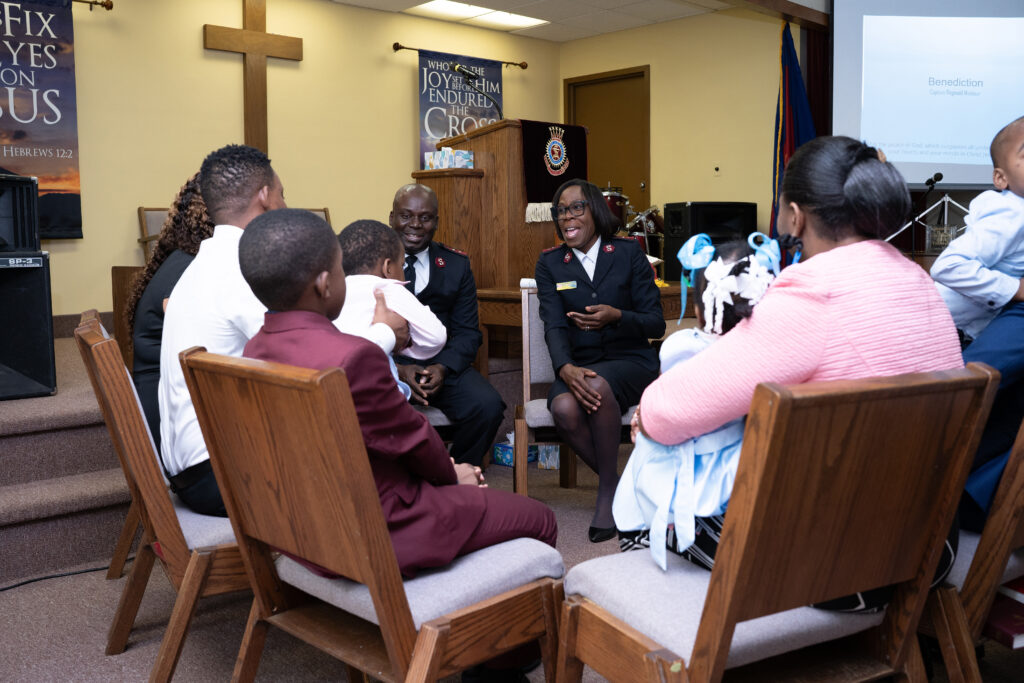
The Dover Corps in Delaware is led by Captains Reginald and Ardrine Montour (right, in uniform). Like a majority of their congregation, the captains are from Haiti.
“We don’t want anyone new to this country to just trust anybody and risk getting taken advantage of, in court or otherwise,” says Captain Reginald. “So my wife and I help these families with rides to the laundromat, doctor’s appointments, or anything else they need. We hold ‘office hours’ every Sunday after church service, where we help translate and explain important documents or letters from their children’s school.”
“We know a couple who had their first child here,” says Captain Ardrine. “When the mother gave birth, I spent two days in the hospital, in doctor scrubs, by her side. After that, we drove with them to the Department of Motor Vehicles, so they could learn how to properly install and fasten a baby car seat.”
“I like to think of us as a bridge to get these families to where they need to go,” says Captain Reginald. “We share the troubles that we faced as immigrants, with the hope that by accepting our help, they won’t face those same hardships. Sometimes when my wife and I have to be away, we return to a load of work and requests for help. It can be a lot, but we accept that responsibility.”
That responsibility comes to them not just as fellow Haitians, but as God’s arms and legs through The Salvation Army—and the people they help know this. Some of them have worshiped at a Haitian corps in the past; others are more familiar with The Salvation Army’s disaster relief work in Haiti.
“When they see an officer in uniform or a red shield, they say they are reminded of home,” says Captain Ardrine. “And we want everyone who comes to The Salvation Army to feel at home.”
Our immigrant song
Coming to a new home in the United States was a decision made for me by two kind, hardworking people who wanted to give their family a chance at the best future possible. Thousands of families from all over the world do the same every year. Every immigrant has their own song to share—maybe with different lyrics or an unfamiliar melody, but beautiful music just the same.
If my parents had walked a rockier path, I hope a trusting hand would have been offered to help them navigate a strange land. This is what The Salvation Army does every day for families through its programs, ministries, and guidance, with every act done in the name of Christ, for residents and immigrants alike.

